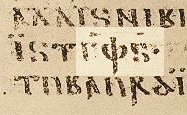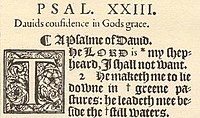God (word)
It is generally agreed that it derives from a Proto-Indo-European neuter passive perfect participle *ǵʰu-tó-m.[1]: 193–194 This form within (late) Proto-Indo-European itself was possibly ambiguous, and thought to derive from a root *ǵʰew- "to pour, libate" (the idea survives in the Dutch verb gieten, meaning "to pour") (Sanskrit huta, see hotṛ), or from a root *ǵʰaw- (*ǵʰewh2-) "to call, to invoke" (Sanskrit hūta).
Depending on which possibility is preferred, the pre-Christian meaning of the Germanic term may either have been (in the "pouring" case) "libation" or "that which is libated upon, idol" — or, as Watkins[2] opines in the light of Greek χυτη γαια "poured earth" meaning "tumulus", "the Germanic form may have referred in the first instance to the spirit immanent in a burial mound" — or (in the "invoke" case) "invocation, prayer" (compare the meanings of Sanskrit brahman) or "that which is invoked".
[4]: 15 God and its cognates likely had a general, predominantly plural or collective sense prior to conversion to Christianity.
It is often connected with Greek "θέω" (theō), "run",[6][7] and "θεωρέω" (theoreō), "to look at, to see, to observe",[8][9] Latin feriae "holidays", fanum "temple", and also Armenian di-k` "gods".
The earliest attested form of the word is the Mycenaean Greek te-o[10] (plural te-o-i[11]), written in Linear B syllabic script.

